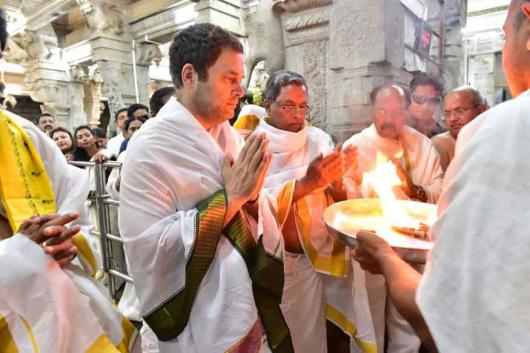In a recent turn of events that has sparked widespread discussion, Congress leader Rahul Gandhi found himself at the center of a controversy involving religious practices and political implications. This incident, which occurred in the context of the Ayodhya Ram Mandir Pran Pratishtha, sheds light on the complex interplay between religion and politics in India.
Gandhi’s Indirect Critique and the Role of Temples in Indian Politics
Rahul Gandhi’s indirect remark about Prime Minister Narendra Modi during the Bharat Jodo Nyay Yatra in Assam highlighted the often intricate relationship between political figures and religious institutions in India. Gandhi’s comment, “Aaj sirf ek vyakti mandir mein ja sakta hain (Only one person can go to the temple today),” was perceived as a subtle critique of the Prime Minister and brought to the fore the issue of accessibility to religious places for political leaders.
The Batadrava Than Incident: Timing and Restrictions
The Than Management Committee’s decision to allow Gandhi’s entry to Batadrava Than in Assam after 3 pm on January 22, the day of the Ayodhya Ram Mandir’s Pranpratishtha, was a significant aspect of this controversy. This directive was given citing the heavy influx of devotees and the organization of various programs at the Than premises. This decision, however, was met with allegations from Congress General Secretary in-charge Communications, Jairam Ramesh, who claimed that the state government was exerting pressure, thus restricting Gandhi’s visit.
Jairam Ramesh’s Allegations and the Political Undertone
Jairam Ramesh’s statement that the Congress had been planning the visit since January 11 and the sudden change in the schedule points to a possible political undertone in the decision-making process. The claim that the restriction was due to state government pressure adds another layer to the controversy, highlighting the potential use of religious sites as tools in political maneuvering.
The Exclusion of Rahul Gandhi from Sankardev Satra Temple Visit
Adding to the complexity of the situation was the allowance for local MPs and MLAs to visit the Sankardev Satra temple in Assam’s Nagaon, while Gandhi was excluded. This led to a protest by Gandhi and other Congress leaders, bringing into question the criteria for permitting political figures to visit religious sites.
Gandhi’s Criticism and the Question of Religious Access
Rahul Gandhi’s criticism of being stopped from visiting the temple in Assam’s Nagaon raised important questions about the role of political leaders in religious spaces and whether such decisions should be influenced by other political figures. Gandhi’s rhetorical question about whether Prime Minister Modi would decide who visits temples encapsulated the broader debate about the intersection of religion and politics in India.
Disclaimer : इस न्यूज़ पोर्टल को बेहतर बनाने में सहायता करें और किसी खबर या अंश मे कोई गलती हो या सूचना / तथ्य में कोई कमी हो अथवा कोई कॉपीराइट आपत्ति हो तो वह jansandeshonline@gmail.com पर सूचित करें। साथ ही साथ पूरी जानकारी तथ्य के साथ दें। जिससे आलेख को सही किया जा सके या हटाया जा सके ।














